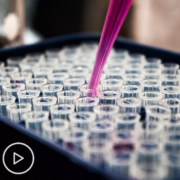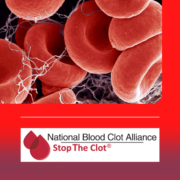The Truth About the Causes of CLL
The Truth About the Causes of CLL from Patient Empowerment Network on Vimeo.
What causes chronic lymphocytic leukemia (CLL)? Dr. Kerry Rogers shares facts and addresses common misconceptions about the causes of CLL.
Dr. Kerry Rogers is a hematologist-oncologist at The James Cancer Hospital and Solove Research Institute. More about Dr. Rogers here.
See More From The Fact or Fiction? CLL Series
Related Resources

|

|

|
Transcript:
Patricia:
Here we go. Dr. Rogers, let’s talk about facts and fiction around CLL. Here’s what we’ve heard from CLL patients. Are these fact or fiction? “Exposure to pesticides caused my CLL.”
Dr. Rogers:
So, this is a very difficult one, and I will preface this by saying I’m not actually an expert in environmental exposures. I am more an expert in CLL management. But, there is some evidence that exposure to pesticides, including Roundup, increases the risk for developing non-Hodgkin’s lymphoma, and there’s a class-action lawsuit against Roundup that my patients keep asking me about.
I think it’s really hard to say for any one person whether or not their cancer is caused by pesticide exposure. If it’s someone that sprayed Roundup in their garden a couple times, then no, I wouldn’t think so. If it’s someone that was bathing in it regularly, exposed to it on the farm all the time, then it might have contributed, but there’s usually more than one thing that goes into someone getting CLL, so I would never plant the entire blame for something on one particular exposure, but I do think it’s quite possible that pesticide exposure can increase a person’s risk for developing CLL and non-Hodgkin’s lymphoma.
Patricia:
This is probably applicable just to veterans. “I was exposed to Agent Orange, and it caused my CLL.”
Dr. Rogers:
So, the same stuff I said about pesticides applies to Agent Orange, but Agent Orange can be a factor in developing CLL. It is in the VA list of diseases associated with Agent Orange exposure. So, for anyone that was exposed to Agent Orange that developed CLL, I would really encourage them to go to the VA and get their Agent Orange intake interview because they are likely entitled to VA benefits because they have CLL and were exposed to Agent Orange.
Patricia:
Do you hear that often from your patients who were exposed to Agent Orange?
Dr. Rogers:
That they’ve gone to the VA? Yes. Actually, I have a couple people that – many of these people get care at the VA, which is also great, but I do take care of a couple of people who have VA benefits due to Agent Orange exposure who have CLL for sure.
I also have a couple people that, despite the fact that they were exposed to Agent Orange, didn’t feel like going to the VA and seeing if they could get benefits, and I think that’s very reasonable, too. Whether or not people wanna do that is an individual decision, but is definitely on the list of Agent Orange exposure-related diseases. And so, the VA could provide care, medications for CLL, and in some cases, other financial benefits, so for anyone who would like, I think contacting the VA if you have CLL and were exposed to Agent Orange is not a bad idea.
Patricia:
How about this one? “CLL is only a disease of the elderly.”
Dr. Rogers:
Oh. Well, that one is definitely not true. So, CLL is not really a disease of children. I’ve never seen someone under 18 with it, and of course, the median age of diagnosis is somewhere between 65 and 70, sort of around 65, so that means that there’s a lot of people less than 65 living with CLL.
I’ve seen people as young as 20, I’ve seen some people in their 30s, I see many people in their 40s and 50s, and also, part of this question is what do you consider elderly? I don’t really know that I consider people in their 60s elderly in many cases. So, people in their 90s are usually willing to accept that they’re elderly, but people in their 60s, often, I wouldn’t call them elderly, and I know you draw these age numbers to say you’re a senior citizen, but there’s more things that contribute to the word “elderly.”
So, I guess what I’d say is this is – CLL is definitely not exclusively a disease of the elderly. There are many people in their 40s living with this, and I’ve seen people as young as their 20s, and then, also, you gotta figure out for yourself where you’re gonna draw the line and say “elderly.”
Patricia:
Sure. How about this one? “CLL is genetic, and my children may inherit it.”
Dr. Rogers:
So, this is a very difficult question. Instead of saying CLL is genetic, I think what I would say is that CLL is heritable, meaning it can run in families.
And, the rough estimate is that 1 in every 10 people that are living with CLL have someone in their family that will also get CLL, so we know that it does run in families – not in every case, but many cases – and I think at least in terms of people I’ve seen with this, people come and see me, and they either say, “Oh yeah, sure, my cousin, my uncle, my parents, my brother – everybody had CLL.” Or, they’ll say, “Really? Someone else in my family could get this?” So, it becomes pretty clear who’s gonna have it in their family and who’s not, but it does increase the risk of your family members getting CLL.
The interesting part of that is as a CLL community, I think we have not done a very – or, we have not been able to pin down a gene that causes it. So, if you think about breast cancer, colon cancer, you can say, “Oh, someone has a BRCA mutation, the family needs to get tested, we can do something to avoid your kids getting breast cancer.”
But really, with CLL, they’ve done a lot of research looking at family cohorts – and, by “they,” I mean not me specifically, but other CLL researchers have done this – and really have not identified anything that’s saying, “Oh, if you have this gene, you’re gonna get CLL, you’re at risk for CLL,” so, we can’t say it’s genetic and there’s one gene it’s pinned on, although it might be genetic based on a constellation of genes or a gene we haven’t identified. So, I think that’s kind of interesting.
The other thing that I’ll say that’s really important when thinking about whether or not your family could be at risk for CLL is that even people that have very what we call unfavorable or high-risk CLL, with something like deletion 17p, other family members that have CLL end up having a pre-CLL condition called monoclonal B lymphocytosis, or 13q CLL, or 11q CLL, so they have a completely different genetic feature for their CLL, even though you can tell they’re in the family as people with CLL.
So, it’s not that the CLL genetic factors we use to predict how you’re gonna do with it are inherited throughout the family, just the risk for getting CLL. I think that’s important to realize.
The other thing is that unlike breast cancer, where you say, “Oh, this is in your family, you should get breast MRIs, you should consider a prophylactic mastectomy,” there’s not a good screening system for CLL, and since when it’s diagnosed, it’s observed, and there’s no known way that we have to prevent it, it’s not like you have to go and get your entire family tested because we don’t have a genetic test, and a screening is not as beneficial as it is in breast cancer where you can get a surgery to prevent yourself from getting the disease. Does that make sense? Okay.
Patricia:
Thank you. What are some of the things that you hear from your patients that we haven’t mentioned?
Dr. Rogers:
About CLL?
Patricia:
About the way they got it.
Dr. Rogers:
Oh, the way they got it. Hmm.
I think the most common things I hear from people that we haven’t mentioned are in either the exposure category, to things that aren’t known to cause CLL, or infections, like, “Oh, I had a really bad bout of influenza,” or “I got pneumonia, and then I got CLL.” I don’t know if these – I don’t know if any infections that are demonstrated to cause CLL.
Sometimes, the white count can go up when people have infections in response to that, because they’re still living immune system cells, so if people get diagnosed when they have an infection because they got their blood drawn or because their white count went up because they were sick, but that’s something common I hear. And so, it’s really hard to say, “Your bout of pneumonia isn’t why you got this,” but it is frequently how people get diagnosed with that, so I hear that sometimes.
Patricia:
What are the actual causes of CLL? What do we know?
Dr. Rogers:
So, CLL, like most blood cancers is – the way I like to think about it is that your blood cells are one of the most rapidly growing and dividing cells in the body.
You know how over the course of your lifespan, your skin sloughs off, your hair grows, you have to cut it? So, your blood cells divide and turn over within your body, and they’re really quite rapidly dividing, and when cells divide, they replicate their genetic material, and just because it happens so many times over the lifespan, they make mistakes and pick up mutations.
So, many of the mutations they pick up either cause that cell to die, which is fine, or cause your immune system to attack it as abnormal, which is fine. But, in some cases, the mistake or mutation they made when the cells were dividing causes the calls to become broken or mutated in a very specific way that makes them CLL. And, it’s probably not just one mutation; it’s probably a series of them that accumulate to cause CLL.
And so, some of these things are those things we test for in a FISH panel, like 17p is an abnormal genetic change that happened as these cells were dividing over the course of the person’s lifespan, but there’s probably more changes than that that go on, and eventually, the cells become CLL, grow out of control, and have the common features of CLL. So, that’s how I like to think about it.
And then, these questions of “Oh, did pesticides contribute? Did this contribute? Did Agent Orange contribute?” is really just about did those agents cause your cells to break or mutate more, or in a specific way that would make them CLL? So, a lot of things that cause cancers in general, and not just CLL or increased risks for cancers in general, are things that alter, break, or change DNA.










